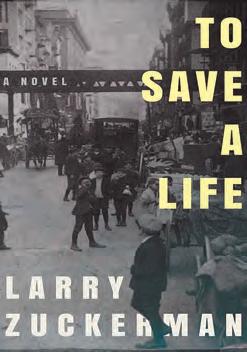


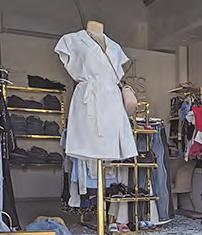










ANNETTE VAN DE KAMP-WRIGHT
Jewish Press Editor
Sunday, June 22 marked the official beginning of the final phase of the Rose Blumkin Jewish Home’s Enhancing Quality of Life project. The planned expansion includes approximately 30,000 square feet and over 30 new rooms. This two-story addition will feature a dedicated short-term rehabilitation floor. All rooms throughout the Home will be converted to single-occupancy, offering greater privacy and comfort. Each new room will include a private shower and spacious living area.
Despite the heat, a large number of com-
SOFIA SOKOLOVSKA
Jewish Press Intern
Summer in Omaha is always full of cheering from the Charles Schwab Stadium during the College World Series, water splashes at Fun Plex and the sound of fireworks in every neighborhood.
However, if you decide to drive by the JCC Summer Camp, you’ll see campers swimming in foam, getting splashed with water balloons, and building sand castles. Every summer, the Jewish Community Center trans-
munity members attended the groundbreaking ceremony, which included speeches and the ceremonial first spades in the dirt. It was a celebration of the incredible impact our community can achieve together.
Jewish Federation of Omaha CEO Bob Goldberg shared: “For the past year, I have repeated the same question numerous times to community members: ‘Is it important that we have the Rose Blumkin Jewish Home as a place where our Jewish community members can come to and be cared for with our community, by our community, on our community campus?’ You have responded with a resounding ‘yes.’
See Groundbreaking page 3
MARY SUE GROSSMAN
In 2002, a young man named Ari Dembitzer was invited by Rabbi Howard Kutner, z’l’, to serve as Beth Israel Synagogue’s High Holiday chazzan. Living in Israel at the time, Ari accepted the invitation, not knowing it was a decision that would change his life’s path.
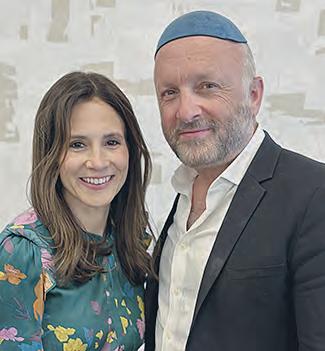
From that first visit, his musical talents, love of Torah and incredible ruach endeared him to the congregation. He continued to return nearly every year and soon referred to Omaha as “Home-aha,” considering Omaha his second home.
In September 2014, the now Rabbi Ari, returned once again, handling additional duties during the chagim, following the departure of Rabbi Jonathan Gross. Josh Gurock, Beth Israel’s president approached him about serving as interim rabbi. Rabbi Ari agreed to do so through December with the date later extended through Sukkot 2015. Finally, he approached the Rabbinic Search Committee, stating he wanted to apply for the position. The decision to extend the offer was speedy and unanimous.

forms into a wonderland of laughter, creativity and new friendships. For kids across the city, it’s more than just a camp, it’s a place where summer memories are made.
A typical day at the Staenberg Kooper Fellman Campus, also re-
ferred to as J-Camp, is packed with excitement from start to finish. Campers begin their morning by singing the Hatikvah, and typically a “bad dad” joke from camp staff member Andrew. Then it’s off to the day’s adventure, with activities rotating throughout the week to keep things fresh and exciting. One hour might bring swimming at the JCC Goldstein Family Aquatic Center, and the next could be spent playing GAGA, a fast-paced, high-energy ball game that’s many campers’ favorite.
Other days are filled with messy art projects, talent show skits, sport tournaments, and even science
See It’s J-Camp! page 2
In addition to settling into his new role, Rabbi Ari was also looking for a shidduch. This quest meant many trips out of Omaha and fortunately, he found the perfect match in Chicago. Laura Klibanow soon visited Omaha and her lovely personality, true interest in others, and love of Torah, meant she immediately received a “stamp of approval” from the congregation.
Married on July 4, 2016, their partnership has made a deep impact on the Beth Israel congregation, the Omaha Jewish community, and beyond. Welcoming five children – Rina, Esther, Uri, Gavriel, and Miriam – made those ties even stronger and they are beloved friends.
On Sunday, Sept. 14, 2025, Beth Israel will celebrate Rabbi Ari and Laura at its 4th Annual Tribute Dinner. While somewhat bittersweet with the Dembitzer family moving to Israel in mid-September, it will be a simcha evening to express See Rabbi Ari page 2
Continued from page 1 experiments. Themed days and surprise challenges keep campers on their toes and ready for whatever is next. Whether they’re diving into a group dance or building a tower out of marshmallows and toothpicks, the goal is always the same. Have fun, try something new, and do it with friends.
But J-Camp isn’t just about play; there’s heart and heritage at its core. Each week includes Jewish activities like Shabbat celebration, learning Hebrew songs or crafting with a cultural twist. These moments help connect campers to their roots in a warm, inclusive setting, while also welcoming those from all backgrounds. Special events throughout the summer give everyone something big to look forward to. There’s the much-loved talent show, where campers take the stage to sing, dance, juggle or tell jokes, whatever makes them shine. Then come the field trips to Omaha favorites like the Belle-

vue Berry Farm, where kids can pick berries and ride the hay ride, or a day at the trampoline park to jump their hearts out. And of course, no summer is complete without Color Wars. Campers are divided into teams that compete in games, relays, and spirit contests. It’s all about teamwork, friendly rivalry, and cheering until your voice is gone. The energy is bright and colorful, and the memories last beyond the final score.
What makes JCamp truly special is the sense of community. Campers don’t just pass the time, they build friendships, gain confidence, and discover more about themselves. The counselors, many of whom have been there for many years, bring a sense of tradition and fun that creates a true camp family. Whether it’s a camper’s first summer or their fifth, each day is an invitation to laugh louder, try harder, and feel a little more connected. The JCC Summer Camp is where childhood summers come to life.
Continued from page 1
Beth Israel’s love and appreciation for this wonderful pair. When asked for her thoughts about Rabbi Ari and Laura, Bette Kozlen shared, “Jack and I knew from the very beginning that Rabbi Ari was truly our rabbi. You are always seen and heard by him. He is our friend, our leader and our teacher. Laura is a good, and very caring, friend plus her program ideas have been a wonderful addition.” Bette concluded saying “While we are sad to know they are leaving, we are nonetheless happy they will be reaching their goal of living in Israel.”
Also to be honored with Beth Israel’s Lifetime Achievement Award will be Helene Shrago. Helene’s thousands of hours of volunteer work, passion for Beth Israel, and her willingness to step in whenever needed make her an excellent selection for the recognition. Honorary chairs for the event are Michael and Melissa Shrago, Sharon Klibanow, David and Tzivia Dembitzer.
The evening will begin with a social hour from 5-5:30 p.m. with dinner and program at 5:30 p.m. Invitations and additional information will be shared by the end of the month. Community members are asked to “save the date” on their calendars and plan to be a part of the celebration. Committee members include Bruce Potash, Helene Shrago, Bette Kozlen, Ron Giller, Howard Kutler, Debbie Roitstein, Nancy Wolf, Sarah Abrahamson, Karen Cohen, Rabbi Mordechai Geiger, and Mary Sue Grossman. To receive Beth Israel’s weekly email and stay up to date on all synagogue happenings, please call the office at 402.556.6288 or email bethisrael@orthodoxomaha.org
The award-winning B’NAI B’RITH BREADBREAKERS speaker program currently meets Wednesdays via Zoom from noon to 1 p.m. Please watch our email for specific information concerning its thought-provoking, informative list of speakers. To be placed on the email list, contact Breadbreakers chair at gary.javitch@gmail.com
The Rose Blumkin Jewish Home (RBJH) is a crown jewel of our campus and it belongs to all of us. By updating our existing facility and transitioning to all private rooms, we can ensure that the RBJH remains the facility of choice for the Jewish community and that its financial viability is preserved. The Rose Blumkin Jewish Home is our safety net. Let’s take care of it together.
Time! This match is available now until July 31, 2025!
Thanks to two amazing community champions, Tom Fellman and Howard Kooper, for this dollar-for-dollar matching gift opportunity!
Continued from page 1
“The Blumkin Home has an established, well-earned reputation as a leader in skilled nursing and as the place to be when one requires this level of care. Our actions today ensure that the Blumkin Home remains the place for compassionate, high-quality care in a first-class environment for generations to come.
“We are deeply grateful to the many donors who made this project possible, including Alan J. Levine (of blessed memory), Tom Fellman, Howard Kooper, the Blumkin family, the Davis family, and the Schrager family.”
Bob added, “With your generous support, we are able to invest in the well-being of our residents and ensure that the Rose Blumkin Jewish Home remains the premier place for compassionate, top-shelf care in an environment that is warm, welcoming, and supportive.”
Bob also thanked the many individuals who played essential roles in bringing this project to life. He began by recognizing RBJH Executive Director Chris Ulven and past Advisory Board Chair Jeff Kirshenbaum, who first envisioned the project.
He expressed deep appreciation for the dedication and leadership of both past and present members of the RBJH Advisory Board, as well as the Jewish Federation of Omaha Governing Board — including new Board Chair Ron Feldman, immediate past Chair Nancy Schlessinger, and former Chairs Mike Siegel, Jon Meyers, and Bruce Friedlander.
ingful, and forward-looking project,” Ron said. “This expansion not only reflects our unwavering commitment to providing the highest standard of care for our elderly, but also embodies our mission — to build and sustain a strong, vibrant Jewish community in Omaha. It stands as a testament to the values that define us as an organization. Today’s groundbreaking represents an important step forward in that ongoing journey.”
He added: “The Rose Blumkin Jewish Home holds a special place in our community. Many of us have loved ones who have been residents — my own mother, aunts, uncles, and currently my sister, have all received care here. It is a blessing to be a part of something that affects my family directly. Time and again, we hear about the compassion of the staff, the quality of care, and the overall excellence of the facility. With the coming expansion, that excellence will only grow. Personally, I rest easier knowing my family members are in such capable and caring hands.”

Special acknowledgment was given to the Enhancing Quality of Life Campaign co-chairs — Norm Sheldon, Bruce Friedlander, Jan Goldstein, and Marty Ricks — for their tireless efforts. Bob also praised the entire team at the Home, whose unwavering focus on resident care has remained steadfast through the challenges of COVID, last year’s remodel, and now, this expansion.
He highlighted the leadership of JFO Chief Operating Officer Phil Malcom, whose talent and focus have been instrumental, and the cost committee — Bob Belgrade, Jeff Kirshenbaum, Norm Sheldon, Larry Kelberg, Jon Meyers, Chris Ulven, and Phil Malcom — who rigorously evaluated every aspect of the plan and budget to ensure sound, community-focused decisions.
Bob gave special mention to Jon Meyers, one of the first major donors to the project, who also contributed his time and expertise as a fundraiser, cost committee member, and project advocate, ensuring the work is done right from the start.
He also thanked Jason Epsenhart, Director of Facilities, and his team for maintaining over 300,000 square feet of building space while managing major construction projects. Finally, he recognized Margie Utesch and the marketing team for their top-tier materials and branding support, and Richard Goedeken and the finance team for their diligent and careful project management.
Ron Feldman, in his first official act as JFO Board Chair, said:”It is a true honor to begin my term with such a mean-
On behalf of the fundraising co-chair, Jan Goldstein said: “I’ve had the privilege over the decades as a professional to take part in many wonderful milestones in our Omaha Jewish community. This one however, I have done so as a community volunteer, and like all of you I am excited to be here. We accomplish remarkable things when we come together, and while I cannot thank each and every
donor today individually, the many generous donors who have made substantial contributions to this project deserve our gratitude and thanks. To all of our donor families that have contributed to this special project at every dollar amount, we say thank you for helping us reach our goal.”
COO Phil Malcom thanked Sampson Construction and shared project updates: “At this stage, we are targeting the end of July 2026 for the completion of the expansion phase. As you may have noticed during visits to our campus, demolition is already underway. Over the next few months, you can expect continued demolition and excavation, followed by the setting of footings and the delivery of construction materials. Once that phase is complete, we’ll begin erecting the structure itself, with the goal of having the building fully framed by February 2026. After framing, we’ll move into the interior and exterior finishing stages. When completed, the new building will extend to within 17 feet of the northwest corner of the Jewish Family Service building. As construction progresses, there will be occasional disruptions along the north drive, and we sincerely appreciate your patience and understanding during this time. Ultimately, this project will be well worth the effort, temporary inconveniences, and investment of resources. We’re excited about what this expansion will mean for our community and the future of the Rose Blumkin Jewish Home.”
The Rose Blumkin Jewish Home has long been a leader in skilled nursing care. This expansion ensures that it will continue to provide compassionate, high-quality care in a firstclass environment for generations to come.
“We feel a sincere connection to the Jewish Community of Omaha and want to be involved in supporting its future through the Life & Legacy program. It is very important to both of us to give back to our community to strengthen and benefit the traditions and institutions for our future generations. Being a part of Life & Legacy gives us that special opportunity to express that commitment.”
JUDY AND JERRY SIMONS
back to sustain the future.
Through Life & Legacy, individuals and families can make a lasting impact by securing the future of the programs and services that shape our Jewish community. From education and cultural programming to social services and senior care, a legacy gift ensures that our Jewish community remains strong for future generations.





For generations, the Omaha Jewish community has been a place of connection, tradition, and support—a home where Jewish life thrives. Judy and Jerry understand that ensuring the continuity of our traditions and institutions is a responsibility we all share. Their commitment to Life & Legacy reflects a deep belief in the power of giving
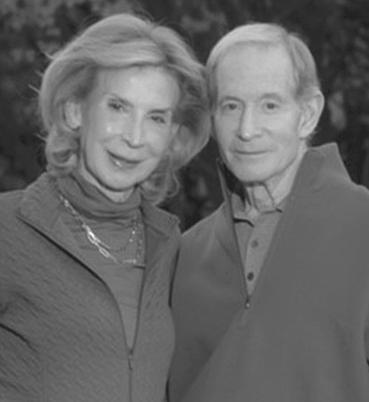
Now is the time to act. Join the Simons in making a meaningful commitment to the Jewish future. By completing a Letter of Intent, you are helping to preserve traditions, strengthen institutions, and create opportunities for generations to come. The first step is simple: complete a Letter of Intent, which can be updated anytime to reflect your changing circumstances. To learn more about how you can participate in our after-lifetime initiative, contact Brad Abramson, Life & Legacy Coordinator at babramson@jewishomaha.org or 402.334.6485.
If you do business with any of our advertisers, please tell them you saw their ad in the Jewish Press. It really helps us!

SOFIA SOKOLOVSKA Jewish Press Intern
For many decades people have had to flee their homeland. Some do it for the idea of a better future, others because of war, and some because of natural disasters. Many stories focus on the hardship of families fleeing their homeland, and the long journey they had to go through to finally reach the “new beginning.” The book
To Save a Life by Larry Zuckerman offers far more than historical fiction, it centers on personal healing. It strongly highlights the seeking of freedom in a new country, where you are promised everything and, more importantly, a new beginning, but end up facing cultural struggles and discrimination. It shows how compassion and love can become tools for resilience.
Set in New York City during 1909, To Save a Life tells the story of two young Jewish immigrants, Malka Kaminsky and Yaakov Rogovin, who are trying to find their way in a country full of change, while facing cultural, ethical and personal challenges. Malka is a runaway bride from an arranged marriage back in her homeland in Eastern Europe, who chases freedom in America. She is strong, smart and not afraid to break rules. Yaakov, who left his home after surviving a violent pogrom, is more serious and thoughtful, but just as determined to build a better life. They both live on the Lower East Side, surrounded by crowded tenements, rigid factory jobs, and the constant pressure of trying to fit in while staying true to who they truly are. Their story shows what it really meant to start over in a new country, and how much courage that takes.
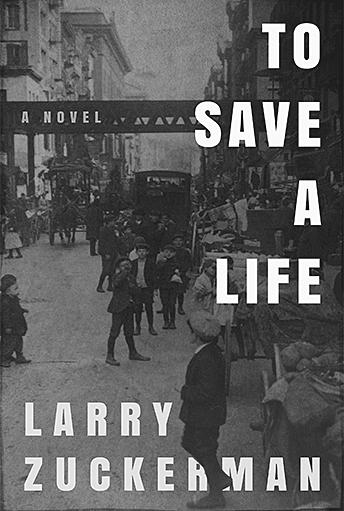
Author Larry Zuckerman was inspired to write the book by his own family’s history of Jewish immigrants who came to America in the early 1900s. His grandparents, who worked in the garment industry on New York’s Lower East Side, faced the harsh realities of sweatshop labor and the struggle to build a new life on unknown and foreign land. Zuckerman was especially influenced by the strong women in his family, like his grandmother who effortlessly switched between Yiddish and English to express everything from sarcasm to deep emotion. These women, bold and resilient, became the foundation of the characters like Malka. The idea for the book first came to him after a visit to the Orchard Street Tenement Museum, where he began asking questions about what it truly meant to start over in America. His goal was to tell a story that honored the bravery, sacrifices, and quiet strength of immigrants, especially the women who defied expectations to shape their own future.
This book is more than a story, it’s a reminder of the sacrifices and strength it took for so many to build new lives in the face of fear, discrimination and poverty. For readers today, especially young people, it’s a powerful way to connect with the past and understand the courage it takes to stand up for yourself, your beliefs, and others. Through its characters and their struggles, the book encourages empathy, resilience, and a deeper appreciation for the stories that helped shape our present.
The Jewish Press Summer Internship is made possible through the generous support of the Chesed Fund.
HOWARD KUTLER
On July 11 from 7:30-9:30 p.m., B’nai Israel Synagogue will welcome Scott Littky, Executive Director of the Institute for Holocaust Education, as their speaker. The entire community is welcome to our monthly second Friday Shabbat service and oneg. Larry Bass will return in July to lead the congregation.

Scott Littky is an experienced Jewish education professional. He will be joining the Nuremberg to the Hague program as a group of Creighton Law School Students visit Auschwitz as a part of their International Justice Course. Scott will share his reflections from the last three summer trips with this program and look forward as he prepares for this year's visit later in July.
Scott began his career in Jewish education in 1985 as a religious school teacher. From 1988 until 1997, he served the Bureau of Jewish Education of Omaha as a Community Teacher. He taught at Friedel Jewish Academy in addition to afternoon religious school programs. Scott served 17 years as a Director of Education beginning at Beth El Synagogue in Omaha, followed by Beth Israel Synagogue in Ann Arbor, MI and Agudas Achim Congregation in Alexandria, VA. During the summer of 2014, Scott returned to live in Omaha where he served for three years as the Program Director at Temple Israel.
Listed on the National registry of Historic Places and continuously active since 1904, B'nai Israel synagogue is one of the region's oldest. In addition to hosting monthly services, arts events, and group activities, we preserve the legacy of Jewish life in Eastern Nebraska and Western Iowa. For more information, please visit our website at www.cblhs.org





NANCY COREN
Waking up to the sound of a loud alert on my phone with the words, “immediate emergency in your neighborhood,” was disconcerting at the least. Fearing that a terrorist attack was perhaps imminent, I dashed out of bed to check that our apartment door was locked and bolted. It was only after that immediate reaction that I noticed the announcement on my phone indicated that Israel was entering the skies over Iran.

After that alert, Israel was on a 6day national lockdown with gatherings and service prohibited, educational activities prohibited, and workplace activities prohibited as well. Fortunately, the Home Front Command alert system had implemented changes to its protocol and it was now possible for us to know in advance when rockets had been launched at us giving us more than the usual 90 seconds to position ourselves next to a safe room or community shelter.
“In the next few minutes alerts are expected in your area… You need to find a better location that will provide the best protection in your area. If an alert is received, enter the protected space and stay there until further notice.” The protocol for exiting the safe space was also changed. Leaving the protected space after 10 minutes was no longer advised. For safety, we were now instructed to leave only after receiving a message from the Home Front Command saying: “ Rocket and Missile Attackthe event has ended. You can leave the protected space. It is required to adhere to the Home Front Command guidelines.”
After the first barrage of rockets entered our airspace, the streets and public spaces here in Jerusalem were eerily empty. Now that we’re a week into this war situation, kids are learning on zoom with their teachers, grocery stores have individuals restocking their food supplies, and safe rooms are set up for possible extended stays. The children in our building are taking breaks from being indoors constantly, and they are meeting each other in our front grassy area with their soccer balls and scooters. Parents and grandparents are of course staying with them as they play just in case a phone app alert is sounded and it necessitates moving the children quickly into the building. Although having adults watching children play in public spaces is the norm in America, here in Jerusalem it has not been the
norm during the almost five years that we’ve lived here. At least here in Jerusalem, I get the sense that tiredness is more prevalent than fear. We know how to react when we hear an alert. We somehow have a sense that our nighttime routine will either involve waking up and moving quickly to a safe space or sleeping for a full night in the safe space just so we don’t have to run for shelter. The Kotel plaza and western wall tunnels as well as Al Aksa Mosque are currently off limits to all, but we have the understanding that such decisions are based on extreme concern for safety. In fact, from what I’ve read, the gates to the Old City are only open for residents living in that part of the city.
Of course, Jerusalem is unlike Tel Aviv, Haifa, and Beersheva which have received many direct hits, leaving thousands without housing, wounding hundreds, and killing many others who were less fortunate. Yesterday’s hit on Soroka Hospital in Beersheva was horrific beyond words. We are blessed that our first responders are always working to ensure that those who have been trapped in rubble are found and saved and that those who have been injured receive life-saving treatments. Magen David Adom is holding blood drives and the government is making sure that those who have had structural damage done to their homes know how to apply for compensation.
When war is still raging, with bombardments and restrictions, perhaps it is wise not to come up with “learnings” gleaned from this situation. There’s always a possibility that one’s impressions will morph over time. However, for now let me say that it appears that an overwhelming number of Israelis are trying to get back home (including my daughter-in-law). There is something about being here, about sensing the unity (not uniformity) of those who live here, something about recognizing how much good the inhabitants of this Land do for one another in their time of need that is quite life-affirming. May these words found in my siddur come about speedily in our day: “I will bring peace to the land, and you shall lie down and no one shall terrify you.Let peace fill the earth as the waters fill the sea.”
Until then, may we continue to attempt to fill the world with the light it so desperately needs as we continue to pray for peace.
‘Write With Us,’ our small and intimate writing workshop (no need to be nervous) continues in the Fall. Upcoming workshops are scheduled for Thursdays, July 24, Aug. 28, Oct. 30, Nov. 13 and Dec. 11 from 5-7 p.m. in the Noshery at the Staenberg Omaha JCC. Register by contacting Jessi at jtaylor@jewishomaha.org or Annette at avandekamp@ jewishomaha.org. There is no cost to attend, although donations are always welcome.
If you have wanted to write your family’s story, that great American novel, or you have always wanted to try your hand at poetry, join us! Maybe you are already an accomplished writer, but you would benefit from being in a room with other writers. Perhaps you have convinced yourself you can’t write at all, but would love to try. Everyone, from absolute beginner to professional, is welcome to attend. We will provide the kosher snacks and the writing prompts.
ETHAN FINKELSTEIN
Hello everyone,

my team in Gaza. I had gone for nearly two months without seeing them.
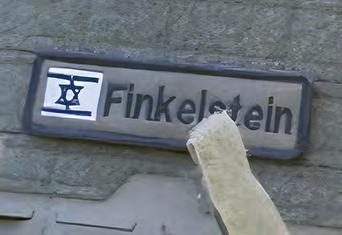
I apologize for it having been so long. A lot has happened since the last time I wrote something. In March I finished training and received my red beret after a 45km trek through the hills outside of Jerusalem to Ammunition Hill.
After that, my team had a month-long course in the south learning reconnaissance and how to use the anti-tank missile called “spike.” In May, I was lucky and had my one-month leave, during which I went back to the States. While there, I traveled a bit and spent a lot of time with friends and family. Just before getting ready to head back, a missile hit Ben Gurion airport in Tel Aviv, delaying and canceling flights for the next month. My stay in America was extended by another three weeks, totaling seven weeks back home instead of four. Meanwhile, my team was called into Gaza the weekend before I came back. After 30 hours of traveling, I finally made it to Tel Aviv; the next day I was back at base getting my gear and preparing to go into Khan Yunis the next night right after Shabbat started. Around midnight on Shabbat, I met up with
I’m not able to go to into detail on everything that happened over there, but there’s one thing out of all the booms and havoc that really stood out to me. When in Gaza, you stay in abandoned houses. These houses have been abandoned for months, if not over a year, and have no electricity or running water. Inside it just feels like a massive oven with endless flies and mosquitoes. The first house we were in belonged to a young family before the war. When you walk in you can see in one of the rooms a work visa that permitted the father to come into Israel every day. In another bedroom you find fake models of AK-47s and pictures of their preschool-aged son with Hamas flags and a gun.
For the remainder of my time in Gaza, I spent hours thinking about that first house. We all questioned: Are there truly innocent people in Gaza? On Oct. 7, was there even one person here who wasn’t parading through the streets and celebrating? How did we continuously let people like this into our country? I was just in awe. Thinking about how hundreds of Gazans would come across the border every day after unimaginable amounts of background checks through the Mossad and Israeli intelligence. Yet somehow there were so many that made it through, people who, if given the chance, would have killed an Israeli without hesitation.
Looking back, it’s crazy that growing up I learned and watched this conflict for the majority of my life, but I never actually thought I’d take part in it.
Yet, here I am. I hope everyone at home is doing well.








JFO Library Specialist
On July 17 at 1 p.m. the Dorothy Kaplan Book Discussion Group will gather for their monthly meeting. Group members have the choice of meeting either in person in Conference Room A in the Staenberg Jewish Community Center or via Zoom. This month they will be discussing The Outside World by Tova Mirvis.
This story is centered around the Goldman and Miller families, two Orthodox families who are trying to cope with a variety of changes occurring in their lives – newly-found religious zealousness, finding a husband for a daughter, and finding the next can’t-lose scheme.
When Bryan “Baruch” Miller returns home from a two-year gap year in Israel at a Yeshiva after high school, his parents Naomi and Joel, and sister Illana barely recognize him. Having grown up in a Modern Orthodox environment, Bryan has become super pious and frum and insists on being called by his Hebrew name, only wears white dress shirts with black pants, davens at least three times a day, will not physically touch women (including his mother and sister), quotes his rebbe constantly, and plans to return to the Yeshiva in Israel, having abandoned his plans to attend Yale.
Shayna Goldman has been planning and dreaming about the wedding of her eldest daughter Tzippy since Tzippy was a young girl but no matter how many dates have been arranged through various matchmakers and friends, Tzippy is still unmarried at twenty-two-years-old. Frustrated by the situation, Tzippy decides to go to Israel to study.
While both kids are studying in Israel, Baruch and Tzippy connect and begin to date. The Miller and Goldman families are not strangers to each other as Shayna and Naomi went to college together and were friends early in their marriages to


Herschel Goldman and Joel Miller who were like oil and water together. Joel especially wants nothing to do with the Goldmans until years later when their children become involved with each other.
Like the phrase “man makes plans and G-d laughs,” the Goldman and Miller families’ futures become tied to each other. Was the marriage of their children destined? The unpredictability of life and the belief that, despite our best efforts to control our destinies, ultimately, Divine Will prevails.
Adding to the story’s chaos are Herschel’s constant get-rich schemes which either are doomed from the start and don’t work out, or they have potential until Herschel tweaks and expands them until they ultimately fail. Convinced of the potential of one of these schemes, the newlyweds relocate to Memphis and get caught up in one of these unsuccessful endeavors.
Please feel free to join us on July 17th at 1 p.m. in person or via Zoom when we are discussing The Outside World. The Dorothy Kaplan Book Discussion Group meets on the third Thursday of every month at 1 p.m. New members are always welcome.
The group receives administrative support from the Community Engagement & Education arm of the Jewish Federation of Omaha. For information about the group and to join in the discussion, contact Shirly Banner at 402.334.6462 or sbanner@jewishomaha.org

402-515-3569
imageentertainment402@gmail.com
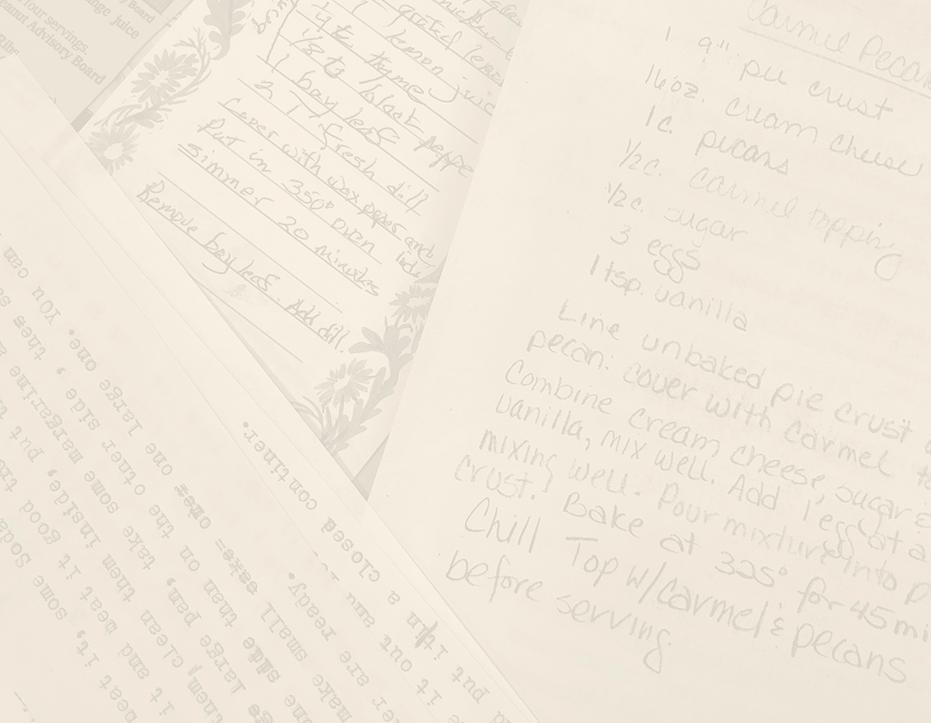

looking for your handwritten family recipes. Please contact Jane or Annette if you are willing to share: jrips@jewishomaha.org avandekamp@jewishomaha.org
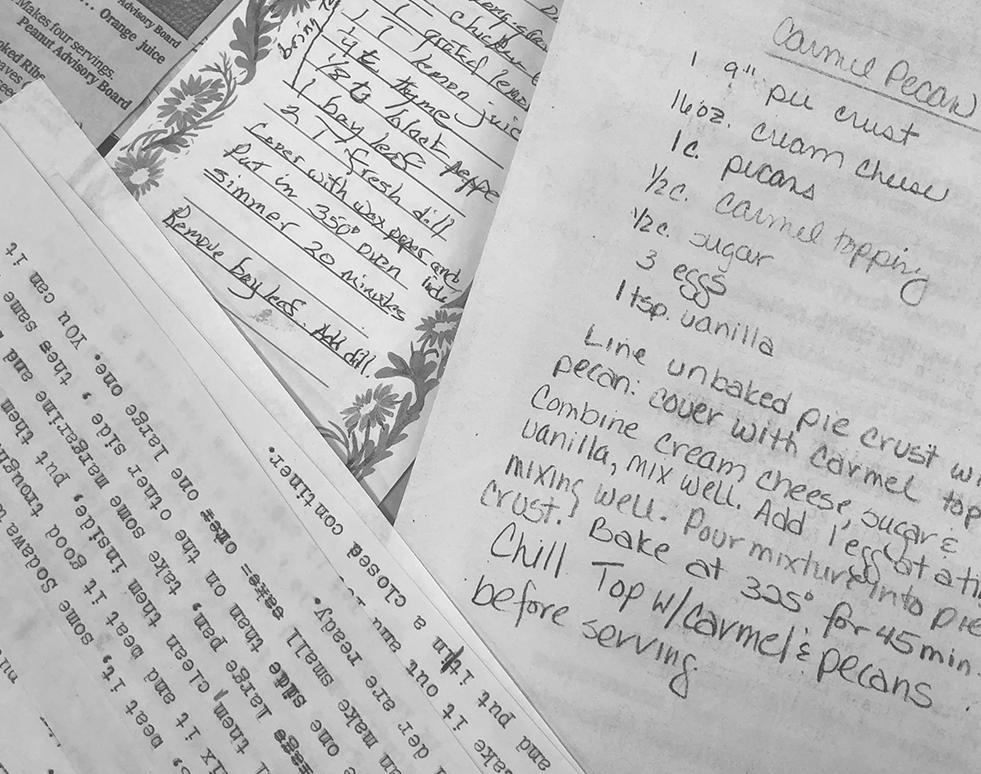

JENNIFER GOODMAN
JFO
Foundation Administrator
The Jewish Federation of Omaha Foundation is pleased to announce that the Shirley and Leonard Goldstein Supporting Foundation’s grants have been awarded for the Spring 2025 semi-annual meeting. Since its inception in 2003, the fund has contributed more than $3 million in charitable grants.
“It’s incredibly gratifying to play a role in helping organizations that are truly changing the world,” said Donald Goldstein, President of the Goldstein Board. “Supporting their missions and seeing the impact of their work is both humbling and inspiring. Rooted in the Jewish values of community, justice, and tikkun olam, we’re proud to stand behind these changemakers and to contribute to the progress they’re making.”
At its May meeting, the Board of Directors of the Shirley and Leonard Goldstein Supporting Foundation approved funding for 26 grant requests. This cycle’s funding priorities include:
founded the Omaha Committee on Soviet Jewry. The committee led protests and hosted Soviet Jewish dissidents (known as refuseniks) and their families in Omaha to share their stories.
With support from her husband Leonard, of blessed memory, Shirley made several trips to the Soviet Union. She secretly carried goods refuseniks could sell on the black market and smuggled out tapes of their testimonies, helping to fire up international backing for their cause. Her activism eventually led to her being banned from the Soviet Union. Shirley then turned her focus to helping relocate approximately 250 Soviet Jews in Omaha and participating in national demonstrations and global human rights forums. Together, Leonard and Shirley also supported resettlement programs in both Israel and the U.S.

• Local projects and programs of the Jewish Federation of Omaha, its agencies, synagogues, and Jewish-service organizations where funding is not available through annual operating budgets
• Programs benefiting Russian Jewry in Omaha, the United States, Israel, and the former Soviet Union
• Local and national Jewish and secular charities focused on medicine and medical research (with an emphasis on kidneyrelated diseases), human rights, rescue and relief, education, and Jewish-themed current events
This spring, we are proud to spotlight one of our grantees and their meaningful work. Beth Israel Synagogue received support to assist with burial expenses for Russian immigrants interred at Beth Israel Cemetery, Golden Hill Cemetery, and Fisher Farms Cemetery, as well as associated costs at the Jewish Funeral Home.
The Omaha Jewish community, thanks in large part to the continued support of the Goldstein Supporting Foundation, has a long history of advocating for Russian Jews. Shirley Goldstein, of blessed memory, a well-known local activist, co-
Many immigrants who settled in Omaha during the 1980s are now aging, and some face financial hardship in covering end-of-life expenses. Providing assistance with these final costs is a natural and compassionate continuation of the Goldstein Supporting Foundation’s longstanding commitment. This support is more than financial — it’s a true mitzvah that eases the burden on families during an especially difficult time.
“This grant has been truly life-changing for many Russian immigrant families, providing tremendous relief during a tumultuous time as they cope with the loss of loved ones,” shared Liora Herskovitz, Executive Director of Beth Israel Synagogue. “We are incredibly blessed to be part of a community that supports those in need and are deeply grateful to the Goldstein Supporting Foundation for making this all possible. While we are truly thankful for the support already given, the continued need for burial assistance remains—and every act of kindness still makes a meaningful difference.”
If you are interested in setting up a supporting foundation or want to learn about other types of funds that you can establish, contact Amy Bernstein Shivvers at the Jewish Federation of Omaha Foundation at 402.334.6466 or ashivvers@ jewishomaha.org













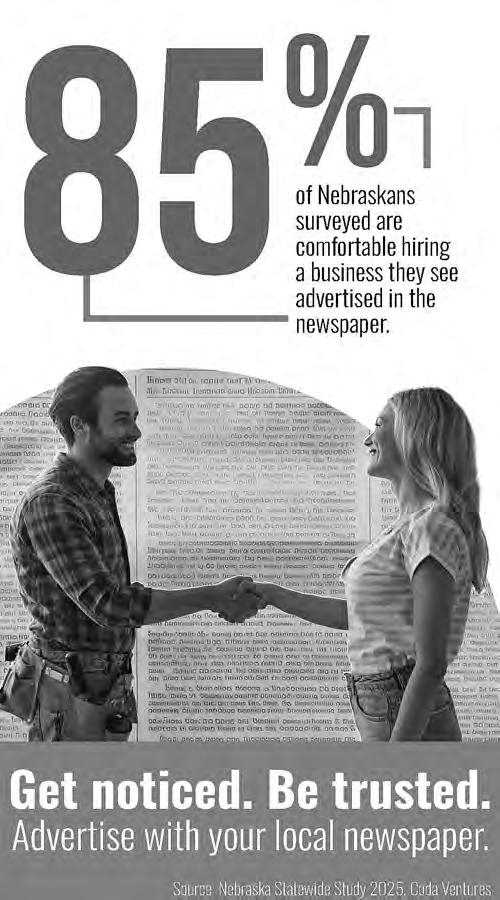
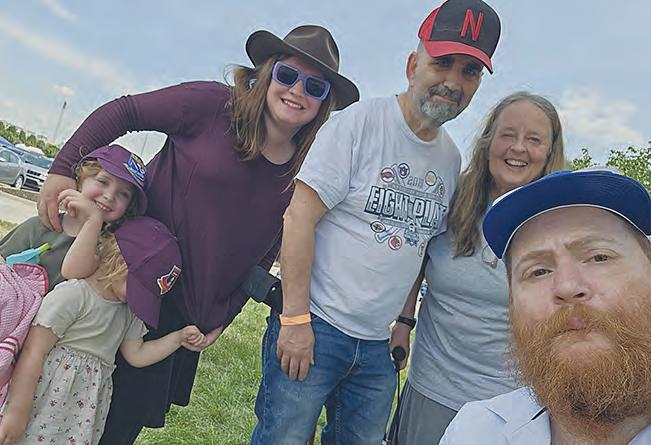
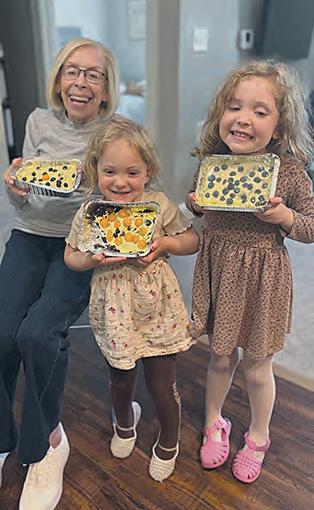
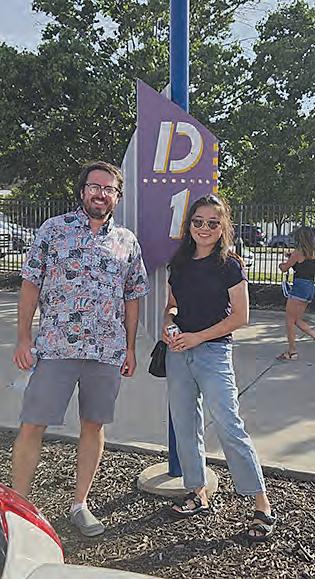







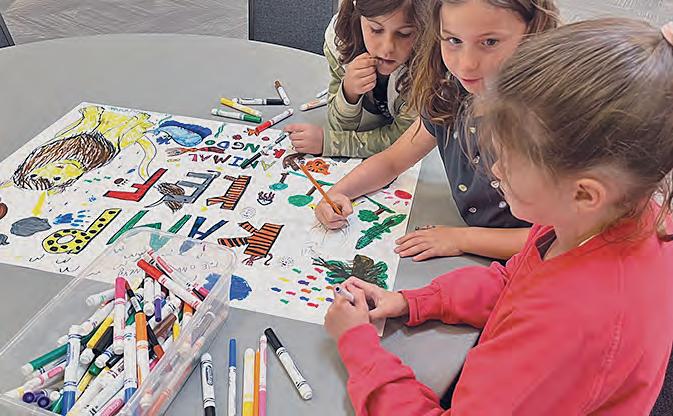
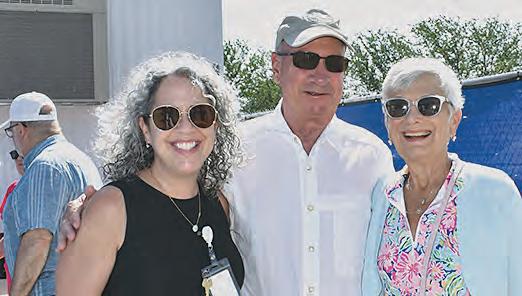
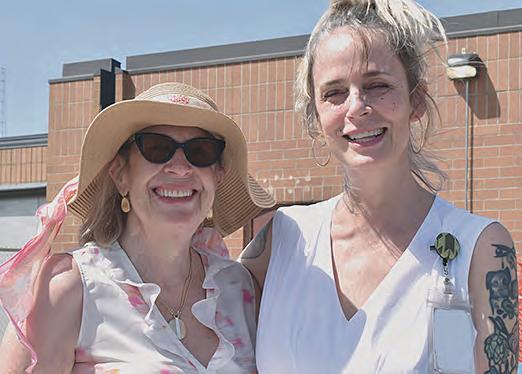

(Founded in 1920)
David Finkelstein
President
Annette van de Kamp-Wright
Editor
Will Fischer
Creative Director
Claire Endelman
Sales Director
Lori Kooper-Schwarz
Assistant Editor
Sam Kricsfeld
Digital support
Mary Bachteler
Accounting
Jewish Press Board
David Finkelstein, President; Margie Gutnik, Ex-Officio; Helen Epstein, Andrea Erlich, Ally Freeman, Dana Gonzales, Mary Sue Grossman, Hailey Krueger, Chuck Lucoff, Larry Ring, Melissa Shrago, Suzy Sheldon and Stewart Winograd.
The mission of the Jewish Federation of Omaha is to build and sustain a strong and vibrant Omaha Jewish Community and to support Jews in Israel and around the world. Agencies of the JFO are: Institute for Holocaust Education, Jewish Community Relations Council, Jewish Community Center, Jewish Social Services, Nebraska Jewish Historical Society and the Jewish Press Guidelines and highlights of the Jewish Press, including front page stories and announcements, can be found online at: www.jewishomaha.org; click on ‘Jewish Press.’ Editorials express the view of the writer and are not necessarily representative of the views of the Jewish Press Board of Directors, the Jewish Federation of Omaha Board of Directors, or the Omaha Jewish community as a whole. The Jewish Press reserves the right to edit signed letters and articles for space and content. The Jewish Press is not responsible for the Kashrut of any product or establishment.
Editorial
The Jewish Press is an agency of the Jewish Federation of Omaha. Deadline for copy, ads and photos is: Thursday, 9 a.m., eight days prior to publication. E-mail editorial material and photos to: avandekamp@jewishomaha.org ; send ads (in TIF or PDF format) to: rbusse@jewishomaha.org
Letters to the Editor Guidelines
The Jewish Press welcomes Letters to the Editor. They may be sent via regular mail to: The Jewish Press, 333 So. 132 St., Omaha, NE 68154; via fax: 1.402.334.5422 or via e-mail to the Editor at: avandekamp@jewishomaha.org.
Letters should be no longer than 250 words and must be single-spaced typed, not hand-written. Published letters should be confined to opinions and comments on articles or events. News items should not be submitted and printed as a “Letter to the Editor.”
The Editor may edit letters for content and space restrictions. Letters may be published without giving an opposing view. Information shall be verified before printing. All letters must be signed by the writer. The Jewish Press will not publish letters that appear to be part of an organized campaign, nor letters copied from the Internet. No letters should be published from candidates running for office, but others may write on their behalf.
Letters of thanks should be confined to commending an institution for a program, project or event, rather than personally thanking paid staff, unless the writer chooses to turn the “Letter to the Editor” into a paid personal ad or a news article about the event, project or program which the professional staff supervised. For information, contact Annette van de Kamp-Wright, Jewish Press Editor, 402.334.6450.
Postal
The Jewish Press (USPS 275620) is published weekly (except for the first week of January and July) on Friday for $40 per calendar year U.S.; $80 foreign, by the Jewish Federation of Omaha. Phone: 402.334.6448; FAX: 402.334.5422.
Periodical postage paid at Omaha, NE. POSTMASTER: Send address changes to: The Jewish Press, 333 So. 132 St., Omaha, NE 68154-2198 or email to: jpress@jewishomaha.org
Editorials express the view of the writer and are not necessarily representative of the views of the Jewish Press Board of Directors, the Jewish Federation of Omaha Board of Directors, or the Omaha Jewish community as a whole.
ANNETTE VAN DE KAMP-WRIGHT
Jewish Press Editor
It is no secret that for many years, the newspaper industry has had its challenges. Like so many other papers around the country, we are seeing fewer advertisers, and facing as ever-rising costs, especially for printing and bulk mail. For many papers, that has meant the end. They simply stopped existing, or went exclusively online. And while for many readers, online news has become commonplace, there is something unique about holding a familiar newspaper in your hands. Giving up that hard copy means losing something we cannot get back.
The Jewish Press is an agency of the Jewish Federation of Omaha and is supported by the Federation and by the generosity from the community. Without these two, we would not still be here, almost 105 years after that first issue.
But it is not enough. We have to look for other income streams. Over the years, we have cut costs, we have cut staff, we’ve written grants and with help from several extremely generous community members, we have built an endowment. We started the Press Club a number of years ago, income from which goes directly into our operating budget.
And then we thought charging for obituaries would be an option. We did extensive research, we talked to editors around the country and looked at other newspapers, who charged hundreds of dol-
The late singer-songwriter Meir Ariel had a hit song that Israelis tend to invoke at times of crisis: Avarnu et Par’o, Na’avor Gam et Zeh — If we survived Pharoah, we’re going to survive this.
You heard it during the COVID pandemic, during the street protests over the government’s planned judicial overhaul, after the trauma of Oct. 7, and yet again earlier this month, when Israel attacked Iran and Iran responded with a hail of missiles.
It suggests a society that is not only used to crisis, but also resigned and resilient. It’s the moral to a story Israelis often tell about themselves, but is it true? And when the triggers begin to multiply — fear for the missing hostages, the scramble to safe rooms and bomb shelters, deep internal rifts over the government and its top leader — how much can Israelis take?
Bruria Wiesel Adini studies that question as the head of the Department of Emergency Management and Disaster Medicine at Tel Aviv University’s School of Public Health. She and her colleagues at TAU and Tel-Hai College have tracked the resilience of Jewish Israelis since the COVID lockdown, with regular questionnaires put to the same people.
Their most recent survey was conducted June 12 and 13, the first and second days of Israel’s strikes on Iran. Like previous studies, the latest results show that when crises strike, Jewish Israelis score high in personal resilience and morale, adjusting to whatever seems to be thrown at them.
On the other hand, researchers continue to find declines in resilience, hope and, crucially, trust in the government at the national level.
Bruria’s team recommends that the government do more to build this societal cohesion by communicating its goals transparently and putting partisanship aside. In times of normalcy (a relative term in Israel), they support programs that encourage community engagement, volunteerism and social support networks
Adini, 69, has a PhD in health systems management. She specializes in emergency preparedness and healthcare system responses to mass casualty events and disasters. In our conversation, we spoke
lars. After careful consideration of all the pros and cons, we decided to give it a try. In our eagerness to bring in extra revenue, we jumped in with both feet and added the obituary charge on Jan. 1 of this year. We decided to give it six months. If it was not a good idea, we told ourselves, the readers will let us know.
And you did. While there were some people who
did not object, many more of you seriously disliked the idea. What was really problematic: we saw a severe drop in submitted obituaries. The Jewish Press is as much a paper as it is a record-keeping tool. We keep track of life cycles, and what is more gratifying than looking back at past issues and seeing the names of family members in the Press? Wedding announcements, B’nai Mitzvah, engagement photos and graduation pages; they are all part of our collective history. Obituaries, painful as they are, belong on our pages. If this paper doesn’t reflect what happens in our community, what good are
about what makes Israelis resilient and the deep divides that could shred the country’s social fabric. Our interview was edited for length and clarity. How much can Israelis take?
How much can we take? Whatever we need to. Whatever we need to face.

I’m a second-generation Holocaust survivor. Both my parents were in Auschwitz; they lost all their family. They were in camps, but they survived. They rebuilt their family. And I’m the example of that. So people have the ability to adjust their life to whatever life actually puts in their midst.
There are people who give up, because they don’t have any element of hope. They actually become ill and are not able to cope. But that’s not the majority of the population.
What does your data tell you about Israeli resiliency?
We measured adversity at its peak, in the week after Oct. 7, when it was a horrific attack and everyone in Israel was in shock, feeling devastated and not comprehending how this could happen. But at the same time, a level of both individual resilience and societal resilience rose very steeply.
We saw the same thing 12 days ago, in the night between the 12th and 13th of June, when there was the Israeli attack on Iran. What we saw again is a very substantial and statistically significant increase in the level of personal resilience and societal resistance.
What we’ve learned is that as the level of distress rises, also the level of resilience rises, not only here,
we?
There were also in-person conversations, emails and phone calls. You told us loud and clear, and I want to tell you: we heard you. As of July 1, 2025, the charge for obituaries is no longer in place. We also hear you when you tell us how much you care about the Jewish Press; that means that we are willing to try creative and unconventional solutions.
If you did not submit your family member’s obituary between Jan. 1 and now, please feel free to send it to us. We will place it in our paper as soon as possible.
We will continue to ask for donations by reminding you of our Press Club or by asking you to consider a contribution to our endowment. Maybe you’ll want to donate in honor of someone’s birthday, B’nai Mitzvah, or to mark a wedding anniversary. It’s up to you, and it will be a happy donation, something done to celebrate everything that is good about our Jewish community.
but in other societies, like in Ukraine during their war. Because you rise to the situation, then you recruit all the resources that you can, all the power, both on the individual level and on the societal level, in order to be able to cope with that. Are there differences across Israeli society — say, among age groups?
Both in COVID and during the war, the retired population, ages 61 and up, have the highest resilience and the lowest levels of distress. The ones that actually are the most vulnerable are the “mid young” people, 31 to 40. They’re the ones whose financial situations are still sometimes unstable, and they’re concerned what is going to happen with their jobs and their position after the adversity. They have children in school. They are actually the backbone of society. They go to reserve duty, and they fight in the war and so on. So we identified them as the vulnerable age group, rather than the elderly.
Are Israelis anxious about the aims or impact of the war itself?
Israelis at large don’t really see the pictures of what is happening in Gaza. They get stories of what is happening to our soldiers, to the military, and what they’re doing in Gaza, they don’t mostly see the stories that people everywhere else in the world are seeing about the destruction, about children and women being impacted, people not having enough food, and so on.
Israelis, after Oct. 7, became much less compassionate, saying “they want to kill us. They are one society. We don’t trust any of them.” The horrific consequences of what happened on Oct. 7 caused such devastation and anger that there’s a lot of opposition among many groups in Israel to providing humanitarian aid to Gazans. I want very much to do the research on both sides of the border, but it is a sensitive and “rifted” discussion here in Israel, Andrew Silow-Carroll is editor at large of the New York Jewish Week and managing editor for Ideas for the Jewish Telegraphic Agency. The views and opinions expressed in this article are those of the author and do not necessarily reflect the views of JTA or its parent company, 70 Faces Media. This op-ed was edited for length. Please see the full story at www.omahajewishpress.com.
B’NAI ISRAEL SYNAGOGUE
618 Mynster Street Council Bluffs, IA 51503-0766
712.322.4705 www.cblhs.org
BETH EL SYNAGOGUE
Member of United Synagogues of Conservative Judaism 14506 California Street Omaha, NE 68154-1980
402.492.8550 bethel-omaha.org
BETH ISRAEL
SYNAGOGUE
Member of Union of Orthodox Jewish Congregations of America 12604 Pacific Street Omaha, NE. 68154
402.556.6288 BethIsrael@OrthodoxOmaha.org
CHABAD HOUSE
An Affiliate of Chabad-Lubavitch 1866 South 120 Street Omaha, NE 68144-1646
402.330.1800 OChabad.com email: chabad@aol.com
LINCOLN JEWISH COMMUNITY:
B’NAI JESHURUN
South Street Temple
Union for Reform Judaism
2061 South 20th Street Lincoln, NE 68502-2797
402.435.8004 www.southstreettemple.org
OFFUTT AIR
FORCE BASE
Capehart Chapel 2500 Capehart Road Offutt AFB, NE 68123
402.294.6244 email: oafbjsll@icloud.com
TEMPLE ISRAEL
Union for Reform Judaism (URJ) 13111 Sterling Ridge Drive Omaha, NE 68144-1206
402.556.6536 templeisraelomaha.com
LINCOLN JEWISH COMMUNITY:
TIFERETH ISRAEL
Member of United Synagogue of Conservative Judaism 3219 Sheridan Boulevard Lincoln, NE 68502-5236 402.423.8569 tiferethisraellincoln.org
Monthly Speaker Series Service, Friday, July 11, 7:30 p.m. with our guest speaker, Scott Littky, IHE Executive Director. Our service leader is Larry Blass. Everyone is always welcome at B’nai Israel! For information about our historic synagogue, please visit our website at www.cblhs.org or contact any of our other board members: Renee Corcoran, Scott Friedman, Rick Katelman, Janie Kulakofsky, Howard Kutler, Carole and Wayne Lainof, Ann Moshman, MaryBeth Muskin, Debbie Salomon and Sissy Silber. Handicap Accessible.
Services conducted by Rabbi Steven Abraham and Hazzan Michael Krausman.
IN-PERSON AND ZOOM MINYAN SCHEDULE: Mornings on Sundays, 9:30 a.m.; Mondays and Thursdays, 7 a.m.; Evenings on Sunday-Thursday, 5:30 p.m.
FRIDAY: Kabbalat Shabbat Services 6 p.m. at Beth El & Live Stream.
SATURDAY: Pride Parade and Watch Party, 8:30 a.m.; Shabbat Morning Services, 10 a.m. at Beth El and Live Stream
SUNDAY: Morning Minyan, 9 a.m. Zoom Only.
MONDAY: Women’s Book Group 6:30 p.m. we will discuss The Trade Off by Samantha Greene Woodruff. Newcomers are always welcome. For more information, contact Darlene Golbitz at 402.490.0731 or email darlene.golbitz@gmail.com
TUESDAY: Journey Through Grief 6:15 p.m. with Wendy Hill; Board of Trustees Meeting, 7 p.m.
FRIDAY-July 18: Kabbalat Shabbat Services, 6 p.m. at Beth El & Live Stream.
SATURDAY-July 19: Shabbat Morning Services, 10 a.m. at Beth El and Live Stream; Quarterly Forum with Marty Shukert, following Shabbat Morning Services. Please visit bethel-omaha.org for additional information and service links.
FRIDAY: Nach Yomi, 6:45 a.m.; Shacharit, 7 a.m.; Mincha/Kabbalat Shabbat, 7 p.m.; Candlelighting, 8:40 p.m.
SATURDAY: Shabbat Kollel, 8:30 a.m.; Shacharit, 9 a.m.; Tot Shabbat 10:30 a.m.; Youth Class 10:45 a.m.; Soulful Torah, 7:45 p.m.; Mincha, 8:30 p.m.; Kids Activity/Laws of Shabbos, 9 p.m.; Havdalah, 9:48 p.m.
SUNDAY: Shacharit, 9 a.m.; Mincha/Ma’ariv, 8:30 p.m.
MONDAY: Nach Yomi, 6:45 a.m.; Shacharit, 7 a.m.; Mincha/Ma’ariv, 8:40 p.m.
TUESDAY: Nach Yomi, 6:45 a.m.; Shacharit, 7 a.m.; Mincha/Ma’ariv, 8:40 p.m.
WEDNESDAY: Nach Yomi, 6:45 a.m.; Shacharit, 7 a.m.; Mincha/Ma’ariv 8:40 p.m.
THURSDAY: Nach Yomi, 6:45 a.m.; Shacharit, 7 a.m.; Character Development, 9:30 a.m.; Mincha/ Ma’ariv, 8:40 p.m.
FRIDAY-July 18: Nach Yomi, 6:45 a.m.; Shacharit,
7 a.m.; Mincha/Kabbalat Shabbat, 7 p.m.; Candlelighting, 8:36 p.m.
SATURDAY-July 19: Shabbat Kollel, 8:30 a.m.; Shacharit 9 a.m.; Tot Shabbat 10:30 a.m.; Youth Class, 10:45 a.m.; Soulful Torah, 7:35 p.m.; Mincha, 8:20 p.m.; Kids Activity/Laws of Shabbos 8:50 p.m.; Havdalah, 9:43 p.m.
Please visit orthodoxomaha.org for additional information and Zoom service links.
All services are in-person. All classes are being offered in-person and via Zoom (ochabad.com/academy). For more information or to request help, please visit www.ochabad.com or call the office at 402.330.1800.
FRIDAY: Shacharit, 8 a.m.; Camp Gan Day 5, 9 a.m.-3 p.m.,; Lechayim, 5:30 p.m., go to ocha bad.com/lechayim to join; Candlelighting, 8:40 p.m.
SATURDAY: Shacharit, 10 a.m. followed by Kiddush and Cholent; Shabbat Ends, 9:47 p.m.
SUNDAY: Sunday Morning Wraps, 9 a.m.; Sunday Pod, 9:30 a.m., RSVP by texting ‘Sunday Pod’ to 402.215.5240.
MONDAY: Shacharit, 8 a.m.; Camp Gan Day 6, 9 a.m.-3 p.m.,; Personal Parsha, 9:30 a.m. with Shani Katzman; Intermediate Biblical Hebrew Grammar, 10:30 a.m. with David Cohen; Parsha Reading, 6 p.m. with David Cohen; Translating Words of Prayer, 7 p.m. with David Cohen.
TUESDAY: Shacharit, 8 a.m.; Camp Gan Day 7, 9 a.m.-3 p.m.,; Aramaic Grammar, 10 a.m. with David Cohen; Translating Words of Prayer, 11 a.m. with David Cohen; Intermediate Biblical Hebrew Grammar, 6 p.m. with David Cohen; Introductory Biblical Hebrew Grammar, 7 p.m. with David Cohen
WEDNESDAY: Shacharit 8 a.m.; Camp Gan Day 8 9 a.m.-3 p.m.,; Mystical Thinking (Tanya) 9:30 a.m. with Rabbi Katzman; Introductory Biblical Hebrew Grammar, 10:30 a.m. with David Cohen; Parsha Reading, 11:30 a.m. with David Cohen.
THURSDAY: Shacharit, 8 a.m.; Camp Gan Day 9, 9 a.m.-3 p.m.,; Introduction to Alphabet, Vowels & Reading Hebrew, 10 a.m.; Advanced Biblical Hebrew Grammar, 11 a.m. with David Cohen; Talmud Study, noon-1 p.m.; Introduction to Alphabet, Vowels & Reading Hebrew, 6 p.m. with David Cohen; Code of Jewish Law Class, 7 p.m.
FRIDAY-July 18: Shacharit, 8 a.m.; Camp Gan Day Last Day, 9 a.m.-3 p.m.,; Lechayim, 5:30 p.m., go to ochabad.com/lechayim to join; Candlelighting, 8:35 p.m.
SATURDAY-July 19: Shacharit 10 a.m. followed by Kiddush and Cholent; Shabbat Ends, 9:41 p.m.
LINCOLN JEWISH COMMUNITY: B’NAI JESHURUN & TIFERETH ISRAEL
Services facilitated by Rabbi Alex Felch. All services offered in-person with live-stream or teleconferencing options.
FRIDAY: Kabbalat Shabbat Service, 6:30 p.m. led
by Rabbi Alex at SST; Shabbat Candlelighting, 8:40 p.m.
SATURDAY: Shabbat Service , 9:30-11 a.m. led by Rabbi Alex at TI; Torah Study noon on Parashat Balak via Zoom; Havdalah, 9:48 p.m.
SUNDAY: Tzom Tammuz Fasting·, 4:22 a.m.–9:37 p.m.; Men’s Bike/Coffee Group, 10:30 a.m. at The Mill Coffee & Bistro, 2021 Transformation Dr #1350, Lincoln. For more information or questions please email Al Weiss at albertw801@gmail.com.
FRIDAY-July 18: Kabbalat Shabbat Service, 6:30 p.m. led by Rabbi Alex at SST; Shabbat Candlelighting, 8:36 p.m.
SATURDAY-July 19: Shabbat Service , 9:30-11 a.m. led by Rabbi Alex at TI; Torah Study noon on Parashat Pinchas via Zoom; Potluck Dinner and Family Game Night, 6 p.m. at SST. Please bring a dish to share for Potluck. Games are available to play, but feel free to bring one of your favorites; Havdalah, 9:43 p.m.
FRIDAYS: Virtual Shabbat Service, 7:30 p.m. every first and third of the month at Capehart Chapel. Contact TSgt Jason Rife at OAFBJSLL@icloud.com for more information.
In-person and virtual services conducted by Rabbi Benjamin Sharff, Rabbi Deana Sussman Berezin, and Cantor Joanna Alexander.
FRIDAY: Drop-In Mah Jongg, 9 a.m. In-Person; Village Walking Group, 10 a.m. In-Person; Classic Shabbat Service, 6 p.m. In-Person & Zoom
SATURDAY: Service and Pride Parade, 8:30 a.m. InPerson; Torah Study, 9:15 a.m. In-Person & Zoom; Shabbat Morning Service, 10:30 a.m. In-Person & Zoom.
SUNDAY: 2nd Sunday Breakfast Service, 9 a.m. at Stephen Center.
WEDNESDAY: Yarn It, 9 a.m. In-Person
THURSDAY: Torah Cantillation Class, 7 p.m. wtih Cantor Alexander — In-Person
FRIDAY-July 18: Drop-In Mah Jongg, 9 a.m. In-Person; Village Walking Group, 10 a.m. In-Person; Shabbat B’yachad Service, 6 p.m. In-Person & Zoom
SATURDAY-July 19: Torah Study, 9:15 a.m. In-Person & Zoom; Shabbat Morning Service, 10:30 a.m. InPerson & Zoom; Let’s Roll: Bowling with Atid, 7 p.m. RSVP Required — In-Person
Please visit templeisraelomaha.com for additional information and Zoom service links.
Partnership2Gether is bringing Mayor Moshe Davidovitch and Ory Rosin to our community for a special Lunch & Learn event on July 25, from 11:30 a.m.–1 p.m., in the Shirley and Leonard Goldstein Engagement Venue at the Staenberg Omaha JCC. This is a wonderful opportunity for our community to learn more from those on the ground about our Partnership region and the current events in Israel. Moshe was born and raised in our Partnership city of Akko. He has served in many public positions, including CEO of Akko Municipality, CEO of the authority of Galilee’s development, and Deputy of Matte Asher Regional Council’s mayor. For the last six years, Davidovitch has served as Matte Asher Regional Council’s mayor and the head of the “Northern Conflict Zone Forum.” Moshe can speak on a variety of topics from the
day after the war began, such as security struggles, evacuation, resilience and community, education and welfare, business and tourism, and future development.
We are also welcoming the new Partnership Director, Ory Rosin. A founding member of Akko’s Ed-
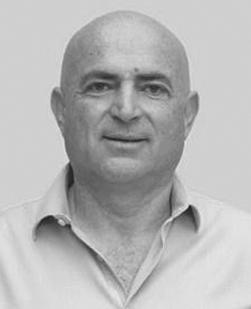

ware company he co-founded with fellow kibbutz members. Before that, Ory served as Director of Community Programs in Akko and as Youth Director and Community Center Director in the Meron HaGalil Regional Council on Israel’s northern border. Ory has a unique view on the Partnership with
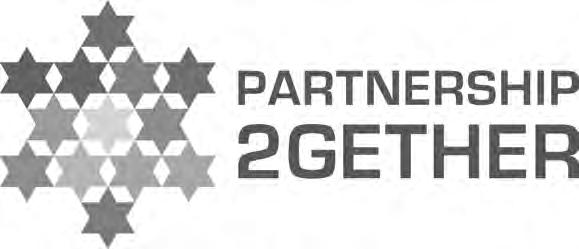
ucators’ Urban Kibbutz, Ory has lived in Akko for 20 years. He has been actively involved with the Western Galilee partnership for over a decade and until recently, served as co-chair of the Young Adults Committee.
Over the last five years, Ory has served as both web developer and manager for “Drorsoft,” a soft-
American Jewry and looks forward to deepening a path toward Jewish and community identity for both Israelis and Jewish communities overseas. Please join us for an engaging program. A kosher lunch will be provided by Star Catering. We can’t wait to see you! For questions or additional information, please contact Jay Katelman at jkatelman @jewishomaha.org
Barry Veret passed away at age 90 in Washington D.C., where he lived and worked as an attorney for the Federal Government. A burial was held in Washington.
He is survived by his wife, Nancy; two step-daughters, Leslie Strittmatter and Linda Kobrin; three grandchildren; one greatgrandchild; two sisters, Linda Rindler and Judy Hoberman; and six nieces and nephews.
Veret moved to Omaha as an infant with his parents, Paul and Freida Veret, in 1935. His father, Paul Veret, was the Executive Vice President of the Jewish Federation of Omaha from the mid30s until his death in the mid-70s. The Kripke-Veret Library in the Omaha Jewish Community Center is named in his memory and the memory of long time Omaha Rabbi Myer Kripke. His
mother, Frieda, continued to live in Omaha for many additional years.
Barry Veret grew up in Omaha, attended Dundee Grade School, graduated from Omaha Central High School in 1953, and subsequently graduated from Princeton University and Harvard Law School. He spent the majority of his career as a lawyer with the State Department Agency for International Development which included foreign tours of duty in Nigeria and Central America. He lived in each of those areas for two years and later wrote about each one of them.
He wrote and published two books, one of fiction and one of original tales and poetry. His life-long love of the outdoors began in his youth with his extensive involvement in Boy Scout Troop 17 at Dundee School.
PHILISSA CRAMER AND GRACE GILSON
JTA
Efforts to broker a ceasefire between Israel and Hamas appeared to be gaining momentum Thursday Jukly 3, with Hamas reportedly signalling satisfaction with assurances outlined in a Washington-backed proposal.
As he awaited the arrival of Israeli Prime Minister Benjamin Netanyahu, President Donald Trump said on Sunday, July 6, that he believed there was a “good chance” of a ceasefire deal in the Israel-Hamas war in Gaza this week.
A deal on the table would include the release of 10 living and 18 deceased hostages over a 60-day ceasefire, from the 20 living and 30 dead hostages that have been held in Gaza since Hamas attacked Israel on Oct. 7, 2023. Israel would also release a large number of Palestinian security prisoners, withdraw its troops to agreedupon buffer zones and increase aid to Gaza.
them,” Netanyahu told reporters in Israel about the hostages before setting out on Sunday. But he reiterated that he was still seeking Hamas’ full surrender.
“We are determined to ensure that Gaza will no longer constitute a threat to Israel,” he said. “We will not allow a situation that encourages more kidnappings, more murders, more beheadings, more invasions. That means one thing: eliminating Hamas’s military and governing capabilities. Hamas will not be there.”

“We’ve gotten a lot of the hostages out, but pertaining to the remaining hostages, quite a few of them will be coming out,” Trump told reporters on Sunday.
If a deal is struck, talks would continue during the 60 days toward a permanent end to the war, with postwar governance a central point of negotiations. Netanyahu faces pressure from key coalition partners not to end the war.
Before heading to Washington, Netanyahu offered mixed signals about the prognosis of a deal. He announced that Hamas had made “unacceptable” demands in its response to terms brokered by Qatar — but he also dispatched negotiators to Doha to keep talking.
He also visited Kibbutz Nir Oz for the first time since Oct. 7, a move that some Israelis interpreted as signaling a likely deal; there he spoke with Sagui Dekel-Chen, an American-Israeli who was released from captivity after 498 days in February, during a previous ceasefire.
“I am determined, we are determined, to bring back all of

Netanyahu’s visit to the White House, where he is expected to meet with Trump on Monday evening, July 7, is his third since Trump retook office earlier this year. After the first meeting, in early February, Trump pledged to “take over” the Gaza Strip, a promise he has not pursued.
During the second, in April, Trump announced direct U.S. talks with Iran, seeming to surprise Netanyahu. After those talks failed, Trump bombed Iran’s nuclear facilities last month, joining Netanyahu’s military campaign there. He demanded and achieved a ceasefire in that war after 12 days and is seen as wanting to replicate that success in the much longer Gaza war.
The planned visit by Netanyahu follows a visit by Israeli Minister for Strategic Affairs Ron Dermer last week for talks with the White House on a potential Gaza ceasefire, Iran and other matters, according to the Associated Press.
It also comes as Israel has faced heightened scrutiny over the killings of Gazans at its aid distribution sites. Two weeks ago, Haaretz reported that Israeli soldiers said that they were ordered to shoot at unarmed Gazans seeking aid, although Netanyahu denied the allegations. On June 30, dozens of people were killed across the Gaza Strip, including at least 11 in the area of a Gaza Humanitarian Foundation (GHF) aid distribution center, according to the Times of Israel. Also on June 30, the Trump administration approved a new $510 million arms sale to Israel to resupply its military with bomb guidance kits for precision munitions.


Our ice cream is made from scratch using all natural ingredients from primarily local producers. We are a small, family-owned Nebraska business that has been dedicated to making ultra-premium ice cream since 1984.



ADVERTISE STATEWIDE for $225/25 word classified ad. Over 140 newspapers with circulation of more than 237,000. Contact your local newspaper or call 1-800-369-2850.
HELLO NEBRASKA! Introducing www.nepublicnotices.com, a new public notice website presented as a public service by all Nebraska newspapers. Free access, fully searchable – because democracy depends upon open government and your right to know.
BANKRUPTCY RELIEF! Help stop Creditor Harassment, Collection Calls, Repossession and Legal Actions! Speak to a Professional Attorney and Get the Help You NEED! Call NOW 844-215-3629
AFFORDABLE PRESS Release service. Send your message to 155 newspapers across Nebraska for one low price! Call 1-800369-2850 or www.nebpress.com for more details.
SWITCH AND save up to $250/year on your talk, text and data. No contract and no hidden fees. Unlimited talk and text with flexible data plans. Premium nationwide coverage. 100% U.S. based customer service. For more information, call 1-877-768-5892
PORTABLE OXYGEN Concentrator? May be covered by Medicare! Reclaim independence and mobility with the compact design and long-lasting battery of Inogen One. Free information kit! Call 855-385-3580.
HELP WANTED
THE SUN-TELEGRAPH in Sidney, NE seeks FT general assignment reporter. Great opportunity to hone skills covering local news, government, and sports. Experience helpful. Send resume, & 3 samples of your work to: wood.saratogasun@gmail.com.
HOME SERVICES
DOES YOUR basement or crawl space need some attention? Call Thrasher Foundation Repair! A permanent solution for waterproofing, failing foundations, sinking concrete and nasty crawl spaces. FREE Inspection & Same Day Estimate. $250 off ANY project with code GET250. Call 1-844-958-3431
THE BATHROOM of your dreams in as little as 1 day. Limited Time Offer - $1000 off or No Payments and No Interest for 18 months for customers who qualify. BCI Bath & Shower. Many options available. Quality materials & professional installation. Senior & Military Discounts Available. Call Today! 1-855-451-2244
WANTED TO BUY
WE BUY 8,000 cars a week. Sell your old, busted or junk car with no hoops, haggles or headaches. Sell your car to Peddle. Easy three step process. Instant offer. Free pickup. Fast payment. Call 1-855-910-0760
This spring we have seen an alarming uptick of activity from anti-Israel groups on some college campuses in Nebraska. From on-campus events and displays like “Chalk & Talk,” screenings of anti-Israel films in public spaces across the community, and in one case, successfully using UNO’s student government to pass a BDS resolution with promises that “this is just the beginning.”
In response, the JCRC has created a working group of Jewish professionals chaired by Dr Ari Kohen that will engage the Harris Center for Judaic Studies at UNL with UNO’s Schwalb Center for Israel and Jewish Studies as well as Jewish students on those campuses and UNMC, and the Israel on Campus Coalition to develop and implement a proactive strategy of engagement and education on the topic of Israel advocacy and antisemitism on our college campuses.
“There are minds and emotions that cannot be changed by facts, but there are tactics and actions that can build relationships with allies who share our values,” said JCRC executive director Sharon Brodkey. A Jewish student organization is being reconstituted on UNO’s campus, and JCRC is convening Jewish students and faculty at UNMC to plan Community Conversations on the critical, life-saving contributions Israeli researchers and pharmaceutical companies have made to medicine. When the 2025-26 school year begins with Durango Days in August at UNO, JCRC will be on hand with Jewish students and other student organizations to build on the success of last spring’s “Spread Cream Cheese, Not Hate” event at UNL. We also plan to invite the community to help with a challah bake and food drive to stock the shelves of UNO’s food pantry.
JCRC is bringing Sharaka to Omaha and Lincoln to host events in conjunction with the Harris and Schwalb centers, so students and faculty may hear and learn from leaders and representatives from Abraham Accords countries who offer a myth-busting and compelling counter-narrative about coex-

istence in the Middle East.
“The increased vile and incendiary antisemitic anti-Israel and anti-Zionist rhetoric on campuses in our state in the wake of targeted violence against Jews in the U.S. calls for strong re-
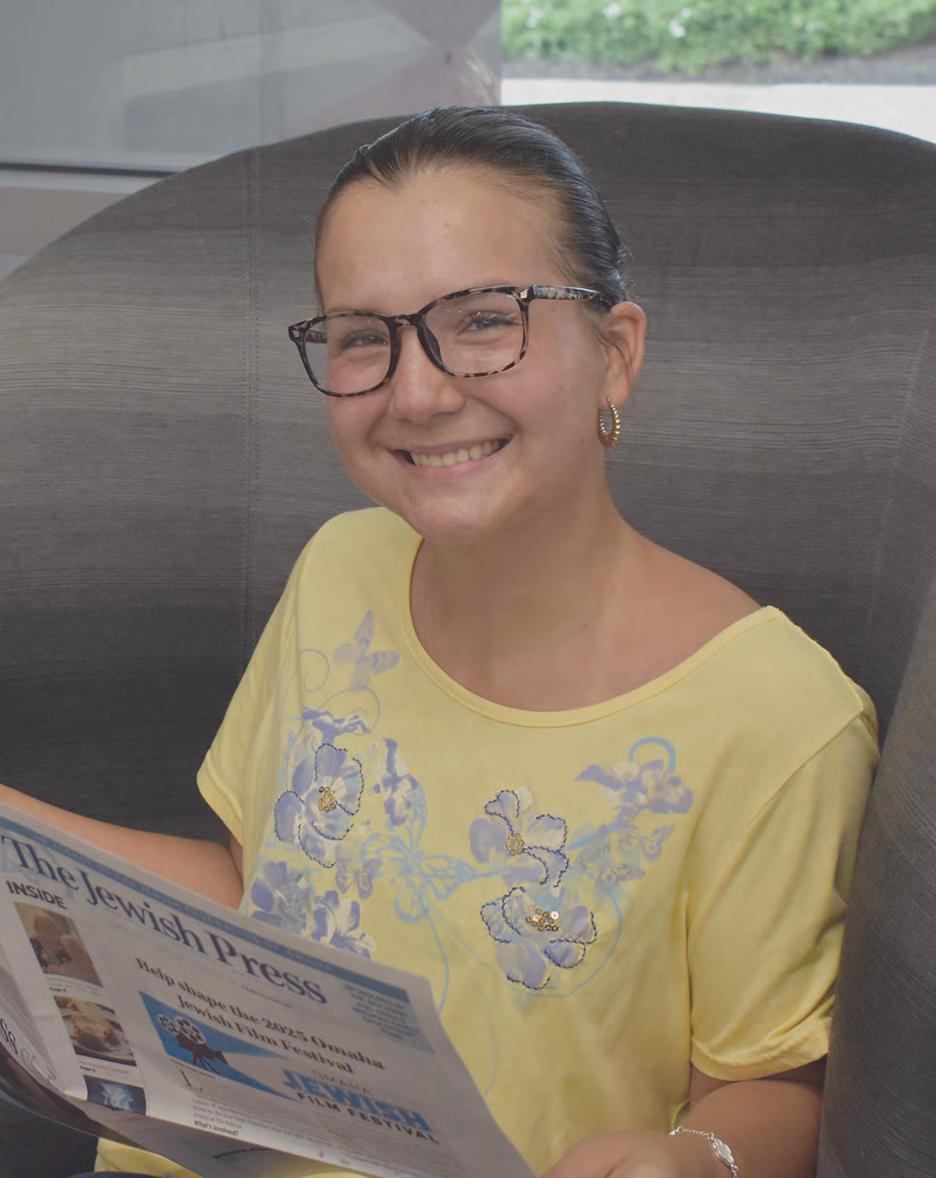
sponse, and that response must be strategic to be effective. The primary objective at this point is to do everything in our power to support our Jewish students and ensure their safety on campus while also doing everything possible to hold our universities accountable for enforcing their own codes of conduct and rules of engagement on campus,” said JCRC executive director Sharon Brodkey, “At the same time, we have to swallow the bitter pill that comes with respecting freedom of speech, no matter how repugnant and inaccurate, no matter how that speech may make us feel.”
“This working group is creating a proactive and coordinated strategy for educating our university communities about Israel and Judaism,” said Ari Kohen, Professor of Political Science and Schlesinger Professor of Social Justice and Director of the Norman and Bernice Harris Center for Judaic Studies. “While these activities have always been important, we know they are absolutely crucial after October 7. The Nebraska Jewish community is always invited to participate in events on our campuses, and this working group will communicate specific requests for action, both on and off campus, throughout the upcoming academic year. As the Jewish community’s liaison to our campuses, the working group will gather input from anyone who wants to get in touch and will host a series of public conversations to provide timely updates to everyone.”
We want to meaningfully engage with our partners in the broader community and to leverage the power of our voices as a Jewish community. To that end, we are also planning a series of community conversations in the coming months, and we will reach out with specific requests for actions that members of our Jewish community can take. In the meantime, if you have questions, suggestions, comments, or concerns, please reach out to Dr. Ari Kohen at ari.kohen@gmail.com or Sharon Brodkey at sbrodkey@ jewishomaha.org
